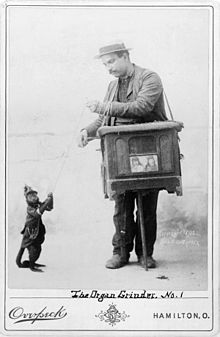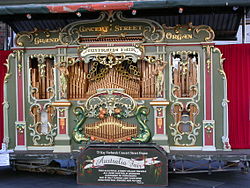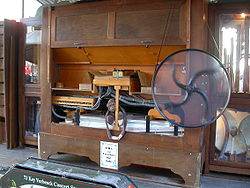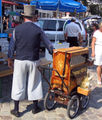- Street organ
-
A street organ is a mechanical organ designed to play in the street. The operator of a street organ is called an organ grinder. The two main types are the smaller German street organ and the larger Dutch street organ.
In the United Kingdom, street organ is often used to refer to a mechanically played piano like instrument. This is incorrect, and such instruments are called a Barrel piano.
Contents
Organ grinders
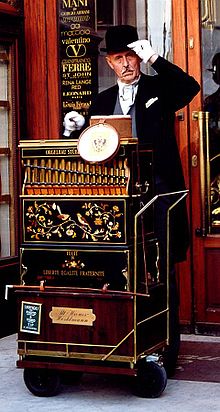 An Austrian organ grinder (locally called "Werklmann") with his paper-roll driven Berlin style barrel organ in Vienna
An Austrian organ grinder (locally called "Werklmann") with his paper-roll driven Berlin style barrel organ in Vienna
The organ grinder was a musical novelty street performer of the 19th century and the early part of the 20th century, and refers to the operator of a street organ.
Period literature often represents the grinder as a gentleman of ill repute or as an unfortunate representative of the lower classes. Newspaper reporters would sometimes describe them cynically or jocularly as minor extortionists who were paid to keep silent, given the repetitious nature of the music. Later depictions would stress the romantic or picturesque aspects of the activity. Whereas some organ grinders were itinerants or vagabonds, many were recent immigrants who chose to be street performers in order to support their families. Those who actually owned their barrel organs were more likely to take care of them and pursue the "profession" more seriously. A few organ grinders still remain, perhaps most famously Joe Bush in the United States.
Exceptionally, the grinder could be a woman, or small child, cranking away on a smaller organ or on a large organ mounted on a pushcart that was sometimes pulled by a donkey. More often than not the grinder was a man, bearing a medium sized barrel organ held in front of him and supported by a hinged or removable wooden stick or leg that was strapped to the back of the organ. The strap around his neck would balance the organ, leaving one hand free to turn the crank and the other to steady the organ. A tin cup on top of the organ or in the hand of a companion (or an animal) was used to solicit payments for his performance. There was an endless variation in the size of the organ. The size varied from a small organ with only 20 notes weighing only 18 pounds to a huge barrel organ with hundreds of pipes weighing several hundred pounds. Larger organs were usually mounted on a cart, although organ grinders were known to carry an instrument weighing over 100 pounds. The most elaborate organs could even have mechanical figures or automata mounted on top of or in the front of the case.
Operation
The grinder would crank his organ in a public place (either a business district or in a neighborhood), moving from place to place after collecting a few coins or in order to avoid being arrested for loitering or chased by persons who would not appreciate hearing his single tune over and over again. The grinder would often[citation needed] have as a companion a White-headed Capuchin monkey to do tricks and attract attention. The monkey would collect the money from the audience and sometimes collect other shiny objects that attracted his attention. After numerous complaints about the sometimes vicious creatures, New York city authorities finally banned organ grinders' monkeys from the streets in 1887.[citation needed] Other attractions might be parrots, dogs, dancing bears and members of the organ grinder's family who would dance and sing.[citation needed]
Many cities in the United Kingdom had ordinances prohibiting organ grinders. The authorities often encouraged policemen to treat the grinders as beggars or public nuisances. In an article from 1929 George Orwell wrote of the organ-grinders of London: " To ask outright for money is a crime, yet it is perfectly legal to annoy one's fellow citizens by pretending to entertain them . Their dreadful music is the result of a purely mechanical gesture, and is only intended to keep them on the right side of the law. There are in London around a dozen firms specializing in the manufacture of piano organs, which they hire out for 15 shillings a week. The poor devil drags his instrument around from ten in the morning till eight or nine at night[-] the public only tolerates them grudgingly - and this is only possible in working-class districts, for in the richer districts the police will not allow begging at all, even when it is disguised. As a result, the beggars of London live mainly on the poor. " [1] In Paris there was a limited number of permits for organ grinders, and entry in that reserved circle was based on a waiting list or seniority system. In New York City (USA), there were as many as 1500 organ grinders on the streets at a time - one on almost every block.[citation needed]
Music lovers usually hated the organ grinders, since most grinders seemed to be tone deaf and lacking any sense of rhythm.[citation needed] They apparently were not interested in keeping their instrument in tune or cranking at a rate suited to the music which was "programmed" in their barrel organ. This was most likely true of the organs that were rented for the day from "organ liveries". The organ grinder would pick up an organ in a small store-front shop and then walk or take the streetcar to his chosen neighborhood. After moving from block to block throughout the day, he would return the organ to the livery and pay a portion of the take to the owner.
Charles Dickens wrote to a friend that he could not write for more than half an hour without being disturbed by the most excruciating sounds imaginable, coming in from barrel organs on the street. Charles Babbage was a particularly virulent enemy of the organ grinders. He would chase them around town, complain to authorities about their noisy presence, and forever ask the police to arrest them.[2] Yehudi Menuhin on the other hand is quoted to have said: "we musicians must stick together" while handing an organ-grinder some change.[citation needed]
According to Ord-Hume the disappearance of organ grinders from European streets was in large part due to the early application of national and international Copyright laws. At the end of the 19th and the beginning of the 20th century European publishers of sheet music and the holders of copyrights to the most popular operatic tunes of the day often banded together in order to enforce collection of performance duties from any musician playing their property in any venue.
When faced with notaries and the hounding of other legal representatives of the music industry of the time, in addition to the other sources of hostility mentioned above organ grinders soon disappeared.
Street organs were banned in New York City in 1936 by Fiorello La Guardia, who cited traffic congestion, the "begging" inherent in the profession, and organized crime's role in renting out the machines.[3] An unfortunate consequence was the destruction of hundreds of organs, the barrels of which contained a record of the popular music of the day. Before the invention of the cylinder record player, this was the only permanent recording of these tunes. The law that banned barrel organs in New York was repealed in 1976 but that mode of musical performance had become obsolete by then. However, organ grinders did return to New York on the 9th of April 2006, when the first organ rally in the area was held in Coney Island.
Modern usage
There are still persons today who own and sometimes operate a barrel organ on a street. They have very little in common with the calling of the organ grinder of yore. For instance, it is considered lucky for a couple in Denmark to have a barrel organ playing outside on the morning of their 25th wedding anniversary, thus creating a small niche for professional musicians or musicologists capable of tuning one of the few surviving barrel organs, and interested in maintaining an old tradition in their spare time.
In addition to a few antique barrel organs, there are many more modern organs that have been built. These do not operate on pinned barrels anymore, but use perforated paper rolls (analogous to player pianos) or perforated cardboard book music (this method is mostly to be found in France Orgue de Barbarie, the Netherlands or Belgium) and sometimes even electronic Microchip- and/or MIDI-systems. Organ grinders are a common sight in Mexico City, and the related street organs are common in Germany and the Netherlands.
Some modern day organ grinders like to dress in period-costumes, albeit not necessarily the period-clothes of an organ-grinder. He would be found at an "organ rally" (in case of the picture the "MEMUSI"-event in Vienna), where lots of enthusiasts would come together and entertain on the streets, but equally so at a wedding (usually performing the "Lohengrin"-tune) or at any other event where he might be chosen over hiring an entire band or a deejay.
Larger organs are not usually turned by hand, but use an electric motor. Such larger instruments are called a fairground organ, band organ or orchestrion.
Varieties
Dutch street organ
Dutch street organs (unlike the simple street organ) are large organs that play book music. They are equipped with multiple ranks of pipes and percussion. As originally built the organ was operated by the 'organ grinder' turning a large handle to operate both the bellows/reservoir and the card feed mechanism. Almost all examples in the Netherlands have now been converted to belt drive from a small battery powered motor or donkey engine, allowing the organ grinder to collect money.
Slightly smaller than the semi-trailer-sized fairground organ the Dutch street organ is nevertheless able to produce enough volume to be heard easily on a busy street corner. Modern Dutch street organs are frequently trailer mounted, and sized for towing behind a pickup or other light truck. Some have a small engine on the front of the chassis allowing them to be self propelled.
Dutch street organs are on display at the Museum Speelklok (formerly 'Nationaal Museum van Speelklok tot Pierement') in Utrecht.
German style street organ
German style street organs are usually operated by a music roll or pinned barrel.
-
A street organ player in Mexico City just off the Zócalo or main plaza.
References
- ^ George Orwell, A Kind of Compulsion, 1903-36, p.134 , from 'Beggars in London' first published in Le Progrès Civique, 12 January 1929
- ^ Babbage, Charles (1864) Passages from the Life of a Philosopher, London: Longman, Green, Longman, Roberts, & Green, Chapter 26, page 342. ISBN 1-85196-040-6
- ^ Roberts, Sam (08/02/2010), "Way Back Machine : If Not for Bias in Ariz., N.Y. Might Be Good for Organ Grinders", New York Times, http://cityroom.blogs.nytimes.com/2010/08/02/way-back-machine-immigrant-bias-in-ariz-organ-grinder-ban-in-n-y-c/?ref=nyregion, retrieved 08/02/2010
- Ord-Hume, Arthur W.J G. Barrel Organ: The Story of the Mechanical Organ and Its Repair. London: George Allen & Unwin, 1978.
- Reblitz, Arthur A. The Golden Age of Automatic Musical Instruments. Woodsville, New Hampshire: Mechanical Music Press, 2001.
- Reblitz, Arthur A., Q. David Bowers. Treasures of Mechanical Music. New York: The Vestal Press, 1981.
- Smithsonian Institution. History of Music Machines. New York: Drake Publishers, 1975.
- Mechanical Music Digest. http://mmd.foxtail.com (since 1995).
- Quotation #2796 by Winston Churchill, from Laura Moncur's Motivational Quotations. http://www.quotationspage.com/quote/2796.html
See also
- Fairground organ : an organ that plays on a fairground
- Dance organ : an organ that plays in a dance hall, ball room or cafe
- Barrel organ : a mechanical organ operated by a pinned barrel rather than a Music Roll or Book music
- Mechanical organ
External links
Categories:- Organs (music)
- Mechanical musical instruments
- Street culture
- Musical instrument stubs
Wikimedia Foundation. 2010.

